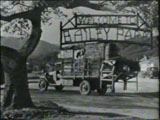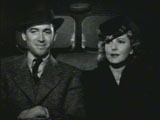 |
|||||||
|
Dan T. Carter Introduction | Previous | Next | JMMH |
|||||||
|
Robert Brent Toplin introduces Dan T. Carter: Thanks Larry. I want to thank Dan Carter for coming to the rescue at the last minute in this effort. Dan Carter is Keenan Professor, a university professor at Emory University, and his books include, Scottsboro: A Tragedy of the American South; When The War Was Over: The Failure of Self-Reconstruction in the South, 1865-1867; The Politics of Rage: George Wallace, The Origins of New Conservatism and the Transformation of American Politics. He’s got some long titles here. We’ve got to get some spiffy short titles as well: From George Wallace to Newt Gingrich: Race in the Conservative Revolution, 1963-1994. Dan T. Carter: I'm sure the question you're really asking yourself, despite what Bob said, is who came up with the bright idea of having Dan Carter pinch hit for former House Speaker Newt Gingrich. If this were a real vaudeville show, this would be the point, right after the announcement, when the tomatoes would start flying and the hook would come.
I began by asking what would, in fact, Mr. Gingrich have said if he had managed to avoid the recent Washington carnage. I’m not working completely in the dark here. He has spoken admiringly of Capra’s films in the past. I’ve recently spent a considerable amount of time reading his immortal words, viewing his telecourse on saving American civilization. I hasten to add this was for the purpose of doing a piece on Mr. Gingrich, not for becoming a disciple. And in fact, he does mention on at least two occasions, very admiringly, Frank Capra films. So I think I have at least some idea of what he might have said. First and foremost, I think he would have embraced the conflict between good and evil that lies at the heart of Capra’s films. In Mr. Gingrich's view politics is war, battles to be fought without quarter in the newspapers and over the airwaves. The number-one fact about the news media, Gingrich told his followers in 1984, is they love fights. You have to give them confrontations. And these confrontations have to be always placed in the context of good and evil.
He would also have shared Mr. Capra’s suspicion and mistrust of the media. Every speech, every book, by Mr. Gingrich is a lamentation over the pernicious and dangerous role played by the media in American life. As he argues in his most recent book, Lessons I Have Learned [Lessons Learned the Hard Way : A Personal Report (New York: HarperCollins, 1998)], "The deep heartfelt traditional values of Americans are treated with a special kind of hostility if not downright ridicule by most of the institutions of the media. Their cynicism is like a cancer on the American spirit." I think he would have seen in Capra films a celebration of traditional values in many ways, particularly the family, and hearthside. "It’s deep in the race," says George Bailey's father, "for a man to want his own roof, walls and fireplace." And community values. When George Bailey's dream and his hopes for Bedford Falls seems on the verge of failure, the people of Bedford Falls do not turn to Washington for help—this is actually an observation which Mr. Gingrich made—they pour out their hearts and their pocketbooks to help each other as neighbors. And of course, there is that deep patriotism. And here, unfortunately, my predecessor has used my quote, but to repeat it, when the cynical reporter takes Longfellow Deeds to the unprepossessing Grant's Tomb, and dismisses it as a washout, he responds with that eloquent quote about what he really sees there—something more profound, ending up with "Things like that can only happen in America." In much the same way when Jefferson Smith goes to the Lincoln Memorial, he emerges spiritually renewed and ready for the battle, to fight the good fight. One can almost see the part as played by Ronald Reagan or perhaps even Mr. Gingrich. Above all, I think our former House Speaker would have warmed to the notion that one heroic figure can take charge and mobilize the inherent decency of the American people, and overcome the selfish elites that seek to retain power against the will of the people. Though he might have been—I wouldn’t bank on it, he might have been too modest to directly draw a connection to himself—he has on occasion made clear that his lifelong political goal has been to become what he calls a "transformational leader," who successfully mobilizes grassroots movements and renews American civilization by returning to traditional values. Previous | NextDan T. Carter Part 1: What Would Mr. Gingrich Have Said? |
|||||||
|
Introduction |
Toplin |
Levine |
Carter |
Multimedia Index | Credits | JMMH Frank Capra's America Copyright © 1999 by The Journal for MultiMedia History | |||||||

